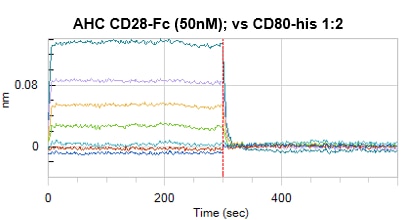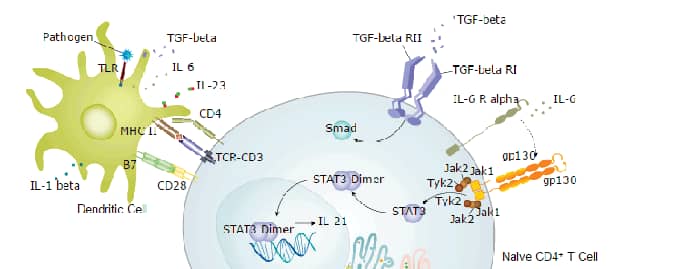Recombinant Human/Cynomolgus/Rhesus Macaque CD28 Fc, CF Summary
- R&D Systems NS0-derived Recombinant Human/Cynomolgus/Rhesus Macaque CD28 Fc (342-CD)
- Quality control testing to verify active proteins with lot specific assays by in-house scientists
- All R&D Systems proteins are covered with a 100% guarantee
Product Specifications
| Human/Cynomolgus Monkey/Rhesus Macaque CD28 (Asn19-Pro152) Accession # P10747 |
DMD | Human IgG1 (Pro100-Lys330) |
| N-terminus | C-terminus | |
Analysis
Product Datasheets
342-CD
Carrier Free
CF stands for Carrier Free (CF). We typically add Bovine Serum Albumin (BSA) as a carrier protein to our recombinant proteins. Adding a carrier protein enhances protein stability, increases shelf-life, and allows the recombinant protein to be stored at a more dilute concentration. The carrier free version does not contain BSA.
In general, we advise purchasing the recombinant protein with BSA for use in cell or tissue culture, or as an ELISA standard. In contrast, the carrier free protein is recommended for applications, in which the presence of BSA could interfere.
342-CD
| Formulation | Lyophilized from a 0.2 μm filtered solution in PBS. |
| Reconstitution | Reconstitute at 100 μg/mL in sterile PBS. |
| Shipping | The product is shipped at ambient temperature. Upon receipt, store it immediately at the temperature recommended below. |
| Stability & Storage: | Use a manual defrost freezer and avoid repeated freeze-thaw cycles.
|
Background: CD28
CD28 and CTLA-4, together with their ligands, B7-1 and B7-2, constitute one of the dominant co-stimulatory pathways that regulate T and B cell responses. CD28 and CTLA-4 are structurally homologous molecules that are members of the immunoglobulin (Ig) gene superfamily. Both CD28 and CTLA-4 are composed of a single Ig
V-like extracellular domain, a transmembrane domain and an intracellular domain. CD28 and CTLA-4 are both expressed on the cell surface as disulfide-linked homodimers or as monomers. The genes encoding these two molecules are closely linked on human chromosome 2 and mouse chromosome 1. Mouse CD28 is expressed constitutively on virtually 100% of mouse T cells and on developing thymocytes. Cell surface expression of mouse CD28 is down-regulated upon ligation of CD28 in the presence of PMA or PHA. In contrast, CTLA-4 is not expressed constitutively but is up-regulated rapidly following T cell activation and CD28 ligation. Cell surface expression of mouse CTLA-4 peaks approximately 48 hours after activation. Although both CTLA-4 and CD28 can bind to the same ligands, CTLA-4 binds to B7-1 and B7-2 with a 20-100 fold higher affinity than CD28. CD28/B7 interaction has been shown to prevent apoptosis of activated T cells via the
up-regulation of bcl-XL. CD28 ligation has also been shown to regulate Th1/Th2 differentiation.
- Lenschow, D.J. et al. (1996) Annu. Rev. Immunol. 14:233.
- Hathcock, K.S. and R.J. Hodes (1996) Advances in Immunol. 62:131.
- Ward, S.G. (1996) Biochem. J. 318:361.
Citations for Recombinant Human/Cynomolgus/Rhesus Macaque CD28 Fc, CF
R&D Systems personnel manually curate a database that contains references using R&D Systems products. The data collected includes not only links to publications in PubMed, but also provides information about sample types, species, and experimental conditions.
7
Citations: Showing 1 - 7
Filter your results:
Filter by:
-
ICOS agonism by JTX-2011 (vopratelimab) requires initial T cell priming and Fc cross-linking for optimal T cell activation and anti-tumor immunity in preclinical models
Authors: A Hanson, K Elpek, E Duong, L Shallberg, M Fan, C Johnson, M Wallace, GR Mabry, S Sazinsky, L Pepper, CJ Shu, S Sathyanara, S Zuerndorfe, T Simpson, M Gostissa, M Briskin, D Law, J Michaelson, CJ Harvey
PLoS ONE, 2020-09-24;15(9):e0239595.
Species: Human
Sample Types: Whole Cells
Applications: Bioassay -
Structural basis for cancer immunotherapy by the first-in-class checkpoint inhibitor ipilimumab
Authors: UA Ramagopal, W Liu, SC Garrett-Th, JB Bonanno, Q Yan, M Srinivasan, SC Wong, A Bell, S Mankikar, VS Rangan, S Deshpande, AJ Korman, SC Almo
Proc. Natl. Acad. Sci. U.S.A., 2017-05-08;0(0):.
Applications: Bioassay -
Selective blockade of CD28-mediated T cell costimulation protects rhesus monkeys against acute fatal experimental autoimmune encephalomyelitis.
Authors: Haanstra K, Dijkman K, Bashir N, Bauer J, Mary C, Poirier N, Baker P, Scobie L, 't Hart B, Vanhove B
J Immunol, 2015-01-14;194(4):1454-66.
Applications: Bioassay -
Cell-extrinsic CTLA4-mediated regulation of dendritic cell maturation depends on STAT3.
Authors: Kowalczyk A, D'Souza C, Zhang L
Eur J Immunol, 2014-01-22;44(4):1143-55.
Species: Human
Sample Types: Whole Cells
Applications: Bioassay -
The soluble forms of CD28, CD86 and CTLA-4 constitute possible immunological markers in patients with abdominal aortic aneurysm.
Authors: Sakthivel P, Shively V, Kakoulidou M
J. Intern. Med., 2007-04-01;261(4):399-407.
Applications: ELISA (Standard) -
Autoantibodies against CD28 are associated with atopic diseases.
Authors: Neuber K, Mahnss B, Hubner C, Gergely H, Weichenthal M
Clin. Exp. Immunol., 2006-11-01;146(2):262-9.
Species: Human
Sample Types: N/A, Serum
Applications: Bioassay, ELISA (Capture) -
Chimeric co-stimulatory molecules that selectively act through CD28 or CTLA-4 on human T cells.
Authors: Lazetic S, Leong SR, Chang JC, Ong R, Dawes G, Punnonen J
J. Biol. Chem., 2002-08-06;277(41):38660-8.
Species: Human
Sample Types: Whole Cells
Applications: Flow Cytometry
FAQs
No product specific FAQs exist for this product, however you may
View all Proteins and Enzyme FAQsReviews for Recombinant Human/Cynomolgus/Rhesus Macaque CD28 Fc, CF
Average Rating: 4.5 (Based on 2 Reviews)
Have you used Recombinant Human/Cynomolgus/Rhesus Macaque CD28 Fc, CF?
Submit a review and receive an Amazon gift card.
$25/€18/£15/$25CAN/¥75 Yuan/¥2500 Yen for a review with an image
$10/€7/£6/$10 CAD/¥70 Yuan/¥1110 Yen for a review without an image
Filter by:







